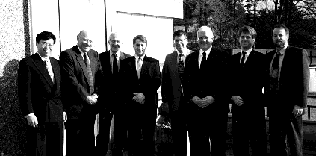GOLDSEA | ASIAMS.NET | ASIAN AMERICAN PERSONALITIES
BIOTECH GOLDENBOY
PAGE 6 OF 12
| "For someone so young to be involved in a situation like that, I thought it was like piloting a jet off an aircraft carrier." |
"In high school when most people would take a trip to Europe or drive cross country, I was literally working every single week, either studying or helping out with the business. My parents didn't believe in sending their kids to Europe."
The rental business eventually made Kuo's parents wealthy enough to build themselves and their four dogs a mansion with five fireplaces and a five-car garage. But that didn't happen until years after Kuo left the family's small ranch-style house to attend Haverford College just outside Philadelphia. He chose it partly for its reputation as a successful pre-med college and partly because his brother had enrolled there the year before.
"My parents thought we both could keep an eye on each other," Kuo says. The school was a two-hour drive from home. During his four years there he made the drive home once a month.
After the blandness of a Harrisburg boyhood, Haverford felt like a cultural festival. Kuo tasted his first bagel, got an eyeful of imported cars, made friends of varied backgrounds.
"That's when I opened my eyes to life in the big city," he says.
Haverford too had an elitist element comprised of those who went to Andover and other prep schools.
"It was partly a caricature of high school," Kuo recalls, "but the rest of the student population wasn't like that."
The cultural diversity was comforting, but Kuo came to see himself as a minority in another respect.
"Haverford is a liberal arts college and the people there are very liberal in their political outlook. I view myself as very conservative. In terms of their political bent, I don't think I fit in, but socially I was fine."

He spent his first two years trying to survive the relentless winnowing process that cut down med school aspirants from half the freshman class of 250 to a small fraction of that by the end of the organic chemistry series in the sophomore year.
"It's a pretty brutal process," Kuo says. "Every semester half the kids drop. I was doing what I could to survive and excel within that type of environment."
The one thing Kuo did make time for was tennis. He made the school team and got to play almost every day.
In his third year, somewhat assured he had made the cut, the molecular biology major opened himself to the attractions of the coed population. During the first week of his third year Kuo enrolled in an economics class at the Bryn Mawr sister campus and found himself seated next to a Filipino American freshman named Gigi Pelaez. He broke the ice by mentioning that he had seen her around the summer before while he was playing tennis with a Swarthmore coed who happened to be a close friend of Gigi. The gambit worked. Before long Gigi was Kuo's first steady girlfriend.
"We started going out and until the time we were married about three or four years ago, we must have talked to each other or saw each other every day in all those years. It's been a tremendous friendship as well as a relationship."
Gigi herself was a pre-med, determined to carry into the fourth generation her family's line of female physicians working in physical medicine and rehabilitation, a specialty that cares for patients suffering from strokes and spinal cord injuries. Both her mother and her stepfather are doctors.
"It's been the women in her family that have been the physicians," Kuo says. "The men in her family were involved in business. It's unusual because the Philippines are very male oriented." PAGE 7
|Page 1 | 2 | 3 | 4 | 5 | 6 | 7 | 8 | 9 | 10 | 11 | 12 |
CONTACT US
|
ADVERTISING INFO
© 1996-2013 Asian Media Group Inc
No part of the contents of this site may be reproduced without prior written permission.
